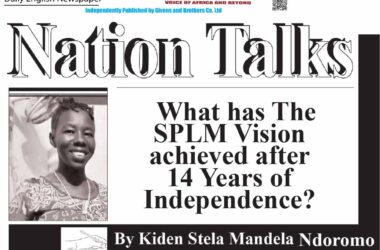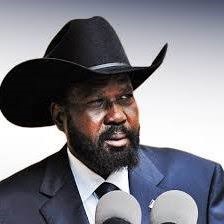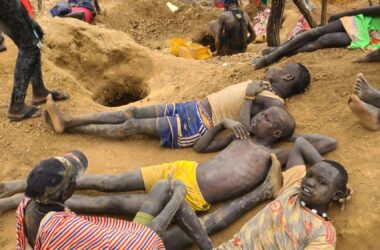By Philip Buda Ladu
President Salva Kiir Mayardit has revealed the reasons behind his decision to frequently replace the Finance Ministers since the nation’s independence.
Since 2020, the finance docket has witnessed seven changes, with the latest being the dismissal of Minister Engineer Awow Daniel Chuang after just four months in the role.
In a presidential decree read on the state-run SSBC Radio and TV on the evening of July 10, 2024, President Kiir sacked Eng. Awow Daniel Chuang and replaced him with Marial Dongrin Ater, amid the worsening economic situation in the country.
Speaking during Ater’s swearing-in ceremony on Friday, the head of state disclosed his rationale for the constant churn in the Finance Minister position, amid the worsening economic situation.
“I am looking for solutions this is why I bring somebody today, tomorrow I kick him out and bring another person” Kiir stated.
“It is everything that I have tried, when I succeed in getting the right person I stick with that and say you work” the president continued.
He echoed the severity of the worsening economic situation in the country where civil servants goes for months without pay.
“We have 9 solid months that people have not received their salaries and we have money” Kiir emphasized. “The money from the non-oil revenues is enough to pay people and to do everything, let us believe that.”
The new finance minister who was an official at the South Sudan Revenue Authority before his appointment has been directed to ensure streamlining non-oil revenues to a single account to cater for the huge government expenditures, especially salaries
“I understand you have been in the South Sudan Revenue Authority and you know how money is being collected from people. If you understand that well I believe you will have no problem at all,” Kiir told Minister Dongrin.
Kiir tasked his new custodian of the country coppers to ensure implementing measures to consolidate non-oil revenues by creating a networked system that will be able to capture or collect money.
The president urged Minister Dongrin to find a solution to deter corruption and leakages at the revenue authority.
“The solution would be that you must have one single account because this money that is being collected, everybody has its own account and these accounts do not come to the people” he continued. “Everyone (official) takes to his Zol Kebir (big man) that he only knows.”
Kiir strongly believes that the collections from the non-oil revenue sector can cover salaries that are more often not paid timely.
“Otherwise we have a lot of money so I give you a very limited time to see what you will do” he instructed.
Dr. Martin Elia Lomuro, the minister of Cabinet Affairs advised the new finance minister to employ a collaborative work approach to be able to deliver on his tasks.
“It is a collective responsibility,
“If we work together you may find ideas from different corners which will push you to achieve the objectives” Lomuro advised.
He however pointed out the demanding nature of the job at the finance docket which the president said he is looking for the perfect person to help his government deliver services to its citizens.
“It is a serious challenge to the president himself you know how many ministers we have had, nearly seven since you are number seven now and some of them six months, one year like that yeah, you really have to focus help him help the country” he emphasized.
For his part Minister Marial Dongrin Ater expressed his gratitude to the President for entrusting him to serve the nation through the Ministry of Finance.
Dongrin acknowledged the challenging opportunity bestowed upon him to tackle the current economic challenges saying he will work together with the larger economic sector to urgently determine a realistic and viable action.
“Your Excellency as I take up my duties and responsibilities I am alive to the reality of the situation however my team in the Ministry of Finance and the larger economic sector and I will quickly determine realistic and viable actions to address pressing economic issues,” he expressed.
South Sudan’s economy has been under pressure in recent years amid communal violence, with crude oil export revenue having dwindled since a 2013-2018 civil war and more recently export disruptions due to war in neighboring Sudan.




